listening剖析
高中英语教材中“Listening”板块的分析——以NSEC必修一为例
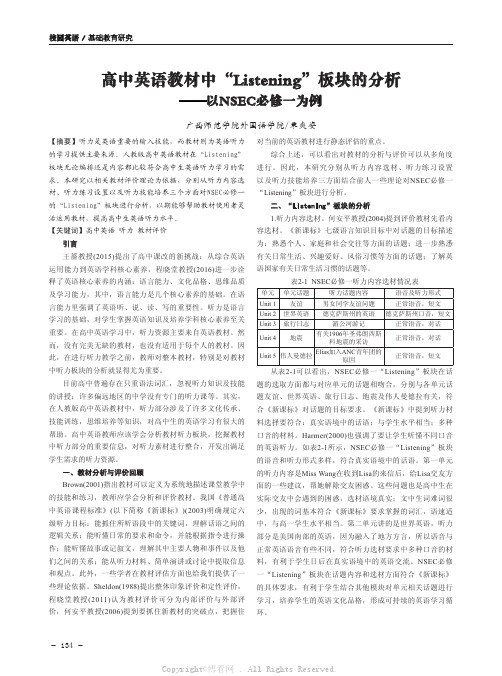
- 134-校园英语 / 基础教育研究【摘要】听力是英语重要的输入技能,而教材则为英语听力的学习提供主要来源。
人教版高中英语教材在“Listening”板块无论编排还是内容都比较符合高中生英语听力学习的需求。
本研究以相关教材评价理论为依据,分别从听力内容选材、听力练习设置以及听力技能培养三个方面对NSEC必修一的“Listening”板块进行分析,以期能够帮助教材使用者灵活运用教材,提高高中生英语听力水平。
【关键词】高中英语 听力 教材评价引言王蔷教授(2015)提出了高中课改的新挑战:从综合英语运用能力到英语学科核心素养,程晓堂教授(2016)进一步诠释了英语核心素养的内涵:语言能力、文化品格、思维品质及学习能力,其中,语言能力是几个核心素养的基础。
在语言能力里强调了英语听、说、读、写的重要性。
听力是语言学习的基础,对学生掌握英语知识及培养学科核心素养至关重要。
在高中英语学习中,听力资源主要来自英语教材。
然而,没有完美无缺的教材,也没有适用于每个人的教材。
因此,在进行听力教学之前,教师对整本教材,特别是对教材中听力板块的分析就显得尤为重要。
目前高中普遍存在只重语法词汇,忽视听力知识及技能的讲授;许多偏远地区的中学没有专门的听力课等。
其实,在人教版高中英语教材中,听力部分涉及了许多文化传承、技能训练,思维培养等知识,对高中生的英语学习有很大的帮助。
高中英语教师应该学会分析教材听力板块,挖掘教材中听力部分的重要信息,对听力素材进行整合,开发出满足学生需求的听力资源。
一、教材分析与评价回顾Brown(2001)指出教材可以定义为系统地描述课堂教学中的技能和练习,教师应学会分析和评价教材。
我国《普通高中英语课程标准》(以下简称《新课标》)(2003)明确规定六级听力目标:能抓住所听语段中的关键词,理解话语之间的逻辑关系;能听懂日常的要求和命令,并能根据指令进行操作;能听懂故事或记叙文,理解其中主要人物和事件以及他们之间的关系;能从听力材料、简单演讲或讨论中提取信息和观点。
listening
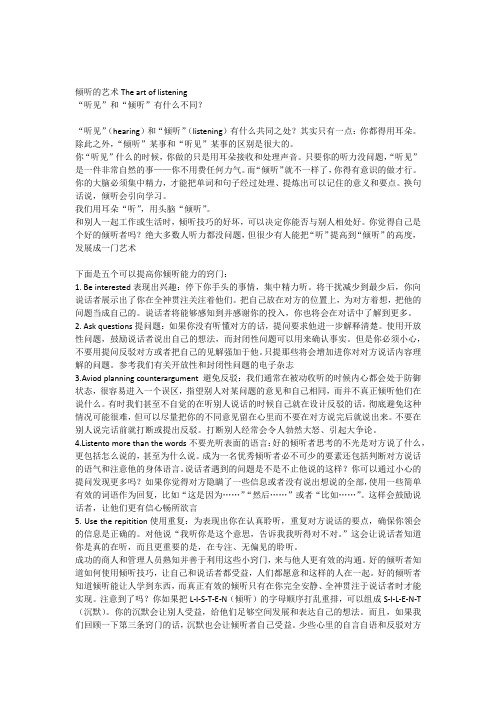
倾听的艺术The art of listening“听见”和“倾听”有什么不同?“听见”(hearing)和“倾听”(listening)有什么共同之处?其实只有一点:你都得用耳朵。
除此之外,“倾听”某事和“听见”某事的区别是很大的。
你“听见”什么的时候,你做的只是用耳朵接收和处理声音。
只要你的听力没问题,“听见”是一件非常自然的事——你不用费任何力气。
而“倾听”就不一样了,你得有意识的做才行。
你的大脑必须集中精力,才能把单词和句子经过处理、提炼出可以记住的意义和要点。
换句话说,倾听会引向学习。
我们用耳朵“听”,用头脑“倾听”。
和别人一起工作或生活时,倾听技巧的好坏,可以决定你能否与别人相处好。
你觉得自己是个好的倾听者吗?绝大多数人听力都没问题,但很少有人能把“听”提高到“倾听”的高度,发展成一门艺术下面是五个可以提高你倾听能力的窍门:1. Be interested表现出兴趣:停下你手头的事情,集中精力听。
将干扰减少到最少后,你向说话者展示出了你在全神贯注关注着他们。
把自己放在对方的位置上,为对方着想,把他的问题当成自己的。
说话者将能够感知到并感谢你的投入,你也将会在对话中了解到更多。
2. Ask questions提问题:如果你没有听懂对方的话,提问要求他进一步解释清楚。
使用开放性问题,鼓励说话者说出自己的想法,而封闭性问题可以用来确认事实。
但是你必须小心,不要用提问反驳对方或者把自己的见解强加于他。
只提那些将会增加进你对对方说话内容理解的问题。
参考我们有关开放性和封闭性问题的电子杂志3.Aviod planning counterargument 避免反驳:我们通常在被动收听的时候内心都会处于防御状态,很容易进入一个误区,指望别人对某问题的意见和自己相同,而并不真正倾听他们在说什么。
有时我们甚至不自觉的在听别人说话的时候自己就在设计反驳的话。
彻底避免这种情况可能很难,但可以尽量把你的不同意见留在心里而不要在对方说完后就说出来。
Listening技巧解读
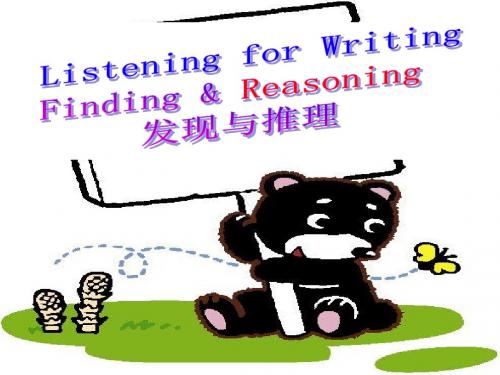
Narrow Down by Reasoning(2) 通过推理锁定范围
Alex’s Free-time Activities
Time
Sunday 17. on__________ at noon
2011年北京中考
Activities
Visit his parents
Байду номын сангаас
18. go out for _________
Problems & Resolutions 问题&解决方案
Common Problems: 1. I can’t understand what the speakers are X talking about at all, not even one English word; 2.I can understand some words,To but there are 待解决 still be solved some parts that I can’t understand; To be solved 待解决 3.I know what the right answers are, but I don’t have enough time to write them down; 4. I know what the right answers are and I write 细心 ,加强练习 ,确保把简单的单词写正确 them down, but some letters are wrong, so I get Xs; 5. I am not careful enough (eg, forget to write the ,按要求程序答题即可 answers in the right养成细心的好习惯 place, write the answer in the blank with wrong question number…)
听说课型模式及解读
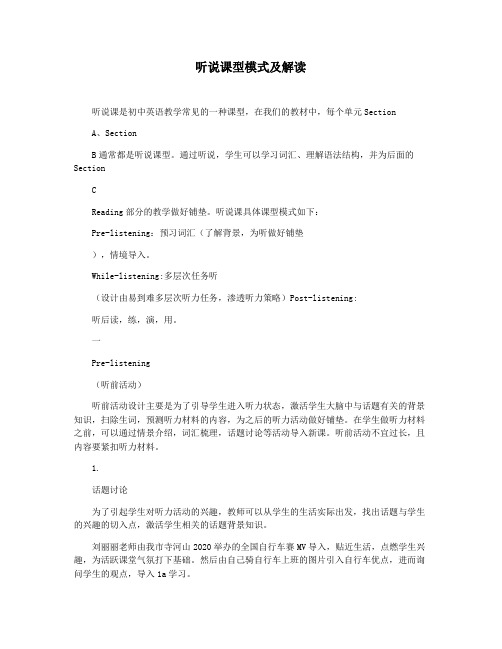
听说课型模式及解读听说课是初中英语教学常见的一种课型,在我们的教材中,每个单元SectionA、SectionB通常都是听说课型。
通过听说,学生可以学习词汇、理解语法结构,并为后面的SectionCReading部分的教学做好铺垫。
听说课具体课型模式如下:Pre-listening:预习词汇(了解背景,为听做好铺垫),情境导入。
While-listening:多层次任务听(设计由易到难多层次听力任务,渗透听力策略)Post-listening:听后读,练,演,用。
一Pre-listening(听前活动)听前活动设计主要是为了引导学生进入听力状态,激活学生大脑中与话题有关的背景知识,扫除生词,预测听力材料的内容,为之后的听力活动做好铺垫。
在学生做听力材料之前,可以通过情景介绍,词汇梳理,话题讨论等活动导入新课。
听前活动不宜过长,且内容要紧扣听力材料。
1.话题讨论为了引起学生对听力活动的兴趣,教师可以从学生的生活实际出发,找出话题与学生的兴趣的切入点,激活学生相关的话题背景知识。
刘丽丽老师由我市寺河山2020举办的全国自行车赛MV导入,贴近生活,点燃学生兴趣,为活跃课堂气氛打下基础。
然后由自己骑自行车上班的图片引入自行车优点,进而询问学生的观点,导入1a学习。
词汇梳理听说课首先要破解词汇关。
听力材料里往往有许多的新单词,为了降低听力难度,在设计活动时,要让学生初步感知生词。
可利用头脑风暴,图片,检测词汇等方式。
荆炜老师从网上搜集了一些与本课词汇有关的图片,目的在于引入本节课的主题,并学习听力材料中的核心生词passengercrazy,pollution等新单词,为接下来的听力活动做准备。
3.创设情境利用实物,教具创设与听力材料相关的情景是最直观,最形象的导入方法,学生会觉得鲜活,真实。
例如罗瑞教师用天安门广场周围的著名建筑物的图片分别放在教室的东西南北,创设了天安门的真实场景,使学生对方位的理解一目了然。
教师要对听力课文进行深度剖析。
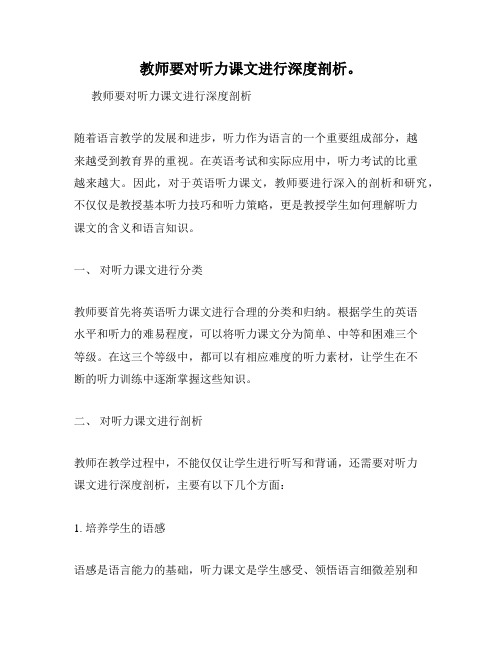
教师要对听力课文进行深度剖析。
教师要对听力课文进行深度剖析随着语言教学的发展和进步,听力作为语言的一个重要组成部分,越来越受到教育界的重视。
在英语考试和实际应用中,听力考试的比重越来越大。
因此,对于英语听力课文,教师要进行深入的剖析和研究,不仅仅是教授基本听力技巧和听力策略,更是教授学生如何理解听力课文的含义和语言知识。
一、对听力课文进行分类教师要首先将英语听力课文进行合理的分类和归纳。
根据学生的英语水平和听力的难易程度,可以将听力课文分为简单、中等和困难三个等级。
在这三个等级中,都可以有相应难度的听力素材,让学生在不断的听力训练中逐渐掌握这些知识。
二、对听力课文进行剖析教师在教学过程中,不能仅仅让学生进行听写和背诵,还需要对听力课文进行深度剖析,主要有以下几个方面:1. 培养学生的语感语感是语言能力的基础,听力课文是学生感受、领悟语言细微差别和语言节奏的好办法。
教师要向学生讲解句子的语调、语气和音调,让学生能够通过听力训练和理解,增加对于语法和语言表达的了解。
2. 关注词汇和语法的认识学生需要在听力课文中认识生词和加深语法的理解。
因此,教师应该在教学过程中插入相应的词汇和语法知识点,帮助学生将听到的句子进行解释,并在听力课文中获得更加深入的理解。
3. 解析听力课文的语境和文化背景听力课文中经常会涉及到文化背景和语境知识。
听力教学过程中,教师可以讲授和解释这些文化背景和语境信息,让学生更好地理解听力课文中的语言和情境。
三、培养学生的听力技巧和听力策略在学生进行听力训练的过程中,应该培养学生相应的听力技巧和听力策略。
例如,教师可以讲解学生如何在音频材料中找到关键信息,如何捕捉细节、强调和重点信息,并对不同类型的听力训练材料提供不同的策略讲解,让学生在听力训练中效率和质量都得到提高。
四、给学生提供多样化的听力素材学生需要接触各种类型的听力素材,如英语新闻、英语电影、英语纪录片、英语音乐等,以提高学生的英语听力水平。
英语听说课例分析
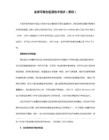
听说课尊敬的各位领导、老师们:大家好!我是来自张龙初中的,很荣幸能有这个机会和大家一起探讨我们的英语教学,今天我将对模块整合五四一之五种课型中的听说课进行课例分析,以此抛砖引玉,展开交流,以便得到大家的指教,从而达到共同提高英语课堂效率的目的。
我们现行使用的外研版教材对于农村学生来说感觉偏难,特别是其中的听说训练,既需要学生有较好的基础知识又要求学生有一定的理解、分析能力,同时我们教师在授课的过程中不可避免的过于重视知识点和语法教学而忽视听说,而模块整合五四一的听说课教学模式打破了这一陋习,让我们在新的教学理念、教学流程的指导下,更好地把握教材、调控课堂。
下面我结合外研版教材初二上册的Module7 Unit1 That smells delicious这一课进行听说课的课例分析。
我的分析流程是教材分析、学情分析、教法学法、教学目标、教学重难点、教学设计、教学反思七个部分。
首先,上好一节听说课的首要条件就是做好本节课的教材分析,做到深挖教材,吃透教材。
我对本节课的分析如下:1.本模块以感觉与印象为中心话题,内容分为两部分:对话——主要以表感觉和知觉的系动词的用法为主,表达对食物或事物的感觉评论;阅读课文——Sally一封信,对英国女孩Sally 印象进行了描述。
学会表达It/sth smells/tastes/feels/looks/sounds…并在此基础上学会一些描述人长相和性格的表达方式,包括句式和一些形容词。
本课教学内容与学生的实际生活密切相关,易于引发学生运用简单的英语进行交际和交流。
这些内容都很符合这一年龄段的学生的兴趣。
在学习活动中,学生通过交换对某些事物或某人的描述及看法,促进学生之间和师生之间的情感交流,增进情谊。
2.本节课的教学内容是第七模块的第一节课。
本教材的第一课以培养学生的听说能力为主,兼顾读写,并包括词汇,语法,语音的学习活动。
在本课中要让学生初步感知系动词的用法,我就用孩子们身边的人或物让学生们通过看,听,尝,闻,感觉来切身的感知这些系动词,使学生能够运用系动词来表达自己的感受。
《Listening and Speaking》 讲义

《Listening and Speaking》讲义《Listening and speaking》讲义在我们的日常交流和学习中,听与说这两项技能是至关重要的。
它们不仅是我们与他人沟通的桥梁,也是获取知识、表达自我的重要途径。
接下来,让我们深入探讨一下“Listening and speaking”。
一、Listening(倾听)1、倾听的重要性倾听是有效沟通的基础。
当我们认真倾听他人说话时,能够更好地理解他们的观点、感受和需求。
这有助于建立良好的人际关系,避免误解和冲突。
同时,通过倾听,我们可以获取丰富的信息,拓宽自己的视野,学习到新的知识和经验。
2、有效倾听的技巧(1)专注集中在倾听时,要将注意力完全集中在说话者身上,避免分心。
放下手中的其他事情,全身心地投入到倾听中。
(2)保持耐心不要急于打断说话者,给他们足够的时间来表达自己的想法。
即使内容可能有些冗长或复杂,也要保持耐心。
(3)理解非语言信息除了语言内容,还要注意说话者的语气、语调、表情和肢体语言等非语言信息,这些都能帮助我们更准确地理解其含义。
(4)提问和反馈在适当的时候,可以通过提问和反馈来表明自己在认真倾听,并进一步澄清不明白的地方。
3、影响倾听效果的因素(1)个人偏见如果我们对说话者持有先入为主的偏见,可能会影响我们对其话语的理解和接受程度。
(2)环境干扰嘈杂的环境、频繁的干扰会分散我们的注意力,降低倾听的效果。
(3)情绪状态当我们处于紧张、焦虑或愤怒等不良情绪中时,可能难以专注地倾听他人。
二、Speaking(说话)1、清晰表达的重要性清晰、准确地表达自己的想法能够让他人更容易理解我们的意图,提高沟通的效率和效果。
同时,良好的表达能力也有助于增强自信心,展示个人魅力。
2、提高表达能力的方法(1)组织思路在开口说话之前,先在脑海中组织好自己的思路,明确想要表达的核心观点和主要内容。
(2)语言简洁明了避免使用过于复杂、冗长的句子和生僻的词汇,尽量用简单易懂的语言表达自己的想法。
Listening1-课件

Listening in Different Contexts
Discover how listening skills vary across various contexts and situations. Explore the importance of effective listening in business, academic, and cross-cultural settings.
Learn to navigate cultural differences and adapt your listening skills to diverse cultural contexts.
Listening for Academic Purposes
Develop strategies to enhance your listening skills in academic settings, such as lectures, presentations, and discussions.
Discover various assessment tools and techniques to evaluate your listening proficiency accurately.
Conclusion and Recap
Summarize the key takeaways from the presentation and reiterate the importance of developing strong listening skills. Provide a final call to action for further practice and improvement.
九年级英文听力材料解析

九年级英文听力材料解析Title: Analysis of Grade 9 English Listening MaterialsIntroduction:In this analysis, we will delve into the listening materials used in Grade 9 English classes. We will explore the importance of listening skills, the types of materials used, and how they contribute to language acquisition and overall fluency. Through a comprehensive understanding of these materials, both teachers and students can enhance their listening abilities and maximize language learning potential.Importance of Listening Skills:Listening is a fundamental language skill that plays a crucial role in effective communication. It involves understanding spoken words, interpreting meaning, and comprehending various tones, expressions, and nuances. Furthermore, listening skills enable individuals to engage in conversations, follow instructions, and absorb information accurately. By improving listening abilities, students can enhance their overall language proficiency and build stronger communication skills.Types of Listening Materials Used:1. Dialogues and Conversations: Dialogues and conversations provide students with exposure to everyday English language use. These materials simulate real-life situations and help learners grasp different accents, intonations, and expressions. They also introduce common conversational phrases, idioms, and expressions.2. News and Broadcasts: News reports and broadcasts expose students to authentic language use in a formal context. These materials help learners familiarize themselves with various topics such as current events, social issues, and global affairs. Students gain exposure to different speaking styles, including interviews, discussions, and debates.3. Lectures and Presentations: Lectures and presentations are often used to develop students' listening skills in an academic setting. These materials help students understand complex ideas, follow logical arguments, and identify key points. They also introduce specialized vocabulary and academic language commonly used in educational settings.4. Short Stories and Narratives: Short stories and narratives engage students through storytelling, enhancing their listening comprehension abilities. These materials expose students to different genres, literary devices, and narrative structures. Students develop their understanding of context, plot development, and character analysis while improving their listening skills.Benefits of Using Listening Materials:1. Improved Listening Comprehension: Regular practice with listening materials allows students to become more familiar with different accents, speeds, and styles of English speech. This exposure hones their ability to understand spoken words and interpret meaning accurately.2. Vocabulary Expansion: Listening materials expose students to a wide range of vocabulary, including idiomatic expressions and colloquialisms. Through repeated exposure, students acquire new words and phrases, which they can incorporate into their own communication.3. Cultural Awareness: Listening materials often reflect diverse cultural perspectives, providing students with a glimpse into different societies, traditions, and customs. This exposure promotes cultural sensitivity and fosters a deeper understanding of the global community.4. Enhanced Pronunciation and Intonation: Regular practice with listening materials helps students improve their pronunciation and intonation. By imitating native speakers, students can refine their articulation, rhythm, and stress patterns, leading to more accurate and natural-sounding speech.Conclusion:The use of various listening materials in Grade 9 English classes is instrumental in developing students' listening comprehension skills and overall language proficiency. Through exposure to different accents, speech styles, and contexts, students become better equipped to understand and engage in real-life conversations. By incorporating appropriate listening materials into the curriculum, teachers empower students to become confident and effective communicators in English.。
四级高频词汇解读listening

四级高频词汇解读listeningListening is an essential skill in language learning and communication. It plays a significant role in various aspects of our lives, such as education, work, and daily interactions. In this article, we will delve into the meaning, importance, benefits, and strategies of effective listening.1. Meaning of ListeningListening refers to the process of receiving, interpreting, and understanding auditory information. It involves actively focusing on spoken words or sounds, processing the meaning behind them, and making sense of the message conveyed. Good listening skills enable us to comprehend and respond appropriately to verbal communication.2. Importance of ListeningEffective listening is crucial for effective communication. It enhances our ability to understand others, convey our thoughts accurately, and build strong relationships. By listening attentively, we can grasp the nuances, emotions, and intentions behind the words spoken. It also helps in acquiring language proficiency, improving academic performance, and developing interpersonal skills.3. Benefits of Listening3.1 Language AcquisitionListening is one of the primary means through which language is acquired. By listening to native speakers or fluent speakers of a particular language, learners can acquire vocabulary, grammar, pronunciation, andintonation naturally. Through exposure to various listening materials, such as music, podcasts, or audiobooks, learners can enhance their language skills and improve overall fluency.3.2 Academic PerformanceEffective listening is crucial for academic success. In educational settings, students need to listen attentively to lectures, presentations, and instructions. By actively listening, students can grasp the content, understand key concepts, and retain information effectively. Good listening skills facilitate note-taking, critical thinking, and participation in class discussions.3.3 Interpersonal SkillsListening plays a significant role in building and maintaining healthy relationships. By actively listening to others, we demonstrate respect, empathy, and understanding. Active listening fosters effective communication, as it allows for clear comprehension of others' perspectives, feelings, and needs. It promotes effective teamwork, conflict resolution, and mutual understanding.4. Strategies for Effective ListeningTo improve listening skills, certain strategies can be implemented:4.1 Focus and Eliminate DistractionsCreate a conducive environment for listening by eliminating distractions. Find a quiet place, turn off electronic devices, and focus solely on the speaker or audio source. Minimizing external distractions enhances concentration and understanding.4.2 Active EngagementEngage actively in the listening process by maintaining eye contact, nodding, and providing verbal or nonverbal cues to show understanding. Stay mentally engaged by summarizing or paraphrasing the speaker's points mentally.4.3 Practice DiscriminationDevelop the ability to discern relevant information from noise, identify key ideas, and distinguish main points from supporting details. Discrimination helps in filtering out irrelevant information and honing in on essential aspects of the message.4.4 Note-takingTaking notes while listening helps in retaining information and organizing thoughts. Develop effective note-taking skills, including abbreviations, symbols, and keywords. Reviewing and reorganizing notes after the listening session can aid in comprehension and recall.4.5 Use Context CluesContextual cues such as tone of voice, facial expressions, and gestures can provide valuable information for understanding the speaker's message. Pay attention to these cues to enhance comprehension.In conclusion, listening is a fundamental skill in language learning and effective communication. It plays a vital role in language acquisition, academic performance, and interpersonal relationships. By adopting strategies such as active engagement, discrimination, and note-taking, wecan enhance our listening skills and reap the numerous benefits it offers. So, let's strive to be active, attentive listeners and continuously improve our ability to understand and connect with others through effective listening.。
Listening1-课件

利用图像和图表
将听力内容与图像和图表相结合,以增强理解和记忆。
使用预测和推断技巧
根据已知信息预测和推断未知信息,以提高听力理解能力。
反思和评估听力理解
反思听力过程
在每次听力练习后,反思自己在 听力过程中的表现,总结经验和
不足。
评估理解程度
通过回答问题、复述听力和总结大 意等方式,评估自己的听力理解程 度。
与电影类似,英语电视剧也是提高听力和口语能力的有效途径。
英语播客
播客是一种可以下载后随时收听的音频节目,适合在路上或休息 时间收听,提高听力水平。
英语新闻和广播节目
英语新闻
通过收听英语新闻,学习者可以了解 国际时事、社会动态等,同时提高听 力水平。
英语广播节目
英语广播节目通常具有娱乐性和教育 性,适合不同年龄段的学习者收听。
制定长期和短期计划
定期评估和调整计划
根据学生的实际情况,制定长期和短 期的听力学习计划,明确学习目标和 时间安排。
定期评估学生的听力进展,根据评估 结果调整学习计划和目标。
设定具体目标
设定具体的听力目标,如提高听力速 度、增强听力理解能力等,以便有针 对性地进行训练。
使用辅助工具和技巧
使用字幕和笔记
听力理解不仅包括对声音的物理属性的感知,如音高、音强、音长等,还包括对语 言、语调、节奏等语言属性的理解。
听力理解是语言交际能力的重要组成部分,是人们获取信息、交流思想的重要手段 。
听力理解的过程
01
02
03
感知阶段
个体通过听觉器官接收声 音信息,并对声音进行初 步的物理属性感知。
解析阶段
大脑对接收到的声音信息 进行分析,识别和理解语 言的语法、语义和语用信 息。
高中英语_listening and speaking教学设计学情分析教材分析课后反思

Book 2 Unit 3 Using language教学设计上高一之后,英语难度突然增大,再加之本校学生的英语水平普遍较低,学生对英语学习就产生了惧怕和不自信。
害怕表达,不相信自己能学好。
这就需要降低难度,并且慢慢引导。
让少部分英语学习好的同学对其他同学进行帮助,加强小组的讨论与学习。
本课内容学生在获取词汇和句型时,老师给出更多的提示引导,多次反复让学生充分弄懂,才能进行小对话的输出。
在展示新词和表达的时候,让学生小组内先互相表达,增加学生的信心和熟练度,让学生更敢于表达。
本堂课为听说课,学生先通过单词和句子的学习,总结有用句型,充分理解句子,加深印象。
并通过对话输出,展示之前所学新词与表达,提高学生综合表达能力。
学生先听文本主线,了解大意。
在了解的基础上细听填词,最后针对个别难词,分段听,让学生听懂、听会。
学生们通过这样的输出形式通,从课文延伸到课外生活,情感方面能得到升华。
同时教师也会引导学生树立一个热爱运动,热爱传统运动的积极态度。
本单元的主题是人与社会—运动,而本节课为听说部分,主要介绍了一个外国人对中国太极从认识到喜欢的内容,引导学生分析她喜欢太极的原因。
通过真实语境下技能的综合训练,学生能够加深对单元主题的理解,提高语言应用能力。
主要内容包括三部分,首先对第一次热身对话的生词和句式结构进行引导熟悉,如,pull-up,skipping,push-up,jogging;It strengthens our upper body. It develops our balance and it is good for our heart .....学生第一次对话,通过对话输出,展示之前所学新词与表达,提高学生综合表达能力。
然后,师生共同总结现代运动,引出传统运动,太极。
并介绍有关太极的背景知识,为听力做铺垫。
接着听力部分,学生先听文本主线,了解大意。
在了解的基础上细听填词,最后针对个别难词,分段听,让学生听懂、听会。
英语听力的分析和探讨
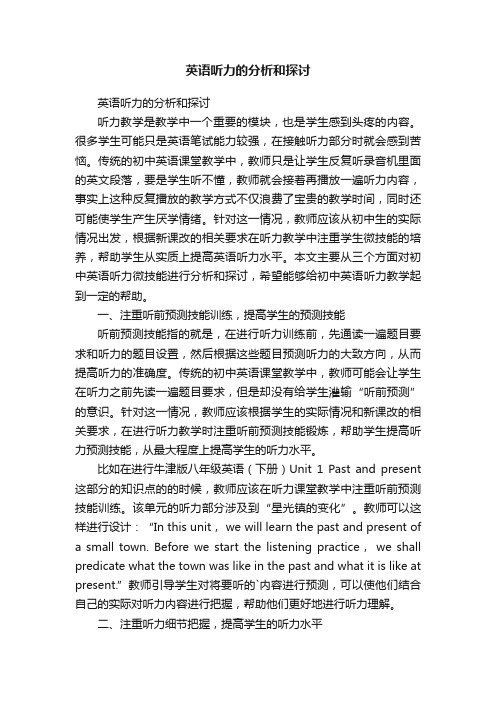
英语听力的分析和探讨英语听力的分析和探讨听力教学是教学中一个重要的模块,也是学生感到头疼的内容。
很多学生可能只是英语笔试能力较强,在接触听力部分时就会感到苦恼。
传统的初中英语课堂教学中,教师只是让学生反复听录音机里面的英文段落,要是学生听不懂,教师就会接着再播放一遍听力内容,事实上这种反复播放的教学方式不仅浪费了宝贵的教学时间,同时还可能使学生产生厌学情绪。
针对这一情况,教师应该从初中生的实际情况出发,根据新课改的相关要求在听力教学中注重学生微技能的培养,帮助学生从实质上提高英语听力水平。
本文主要从三个方面对初中英语听力微技能进行分析和探讨,希望能够给初中英语听力教学起到一定的帮助。
一、注重听前预测技能训练,提高学生的预测技能听前预测技能指的就是,在进行听力训练前,先通读一遍题目要求和听力的题目设置,然后根据这些题目预测听力的大致方向,从而提高听力的准确度。
传统的初中英语课堂教学中,教师可能会让学生在听力之前先读一遍题目要求,但是却没有给学生灌输“听前预测”的意识。
针对这一情况,教师应该根据学生的实际情况和新课改的相关要求,在进行听力教学时注重听前预测技能锻炼,帮助学生提高听力预测技能,从最大程度上提高学生的听力水平。
比如在进行牛津版八年级英语(下册)Unit 1 Past and present 这部分的知识点的的时候,教师应该在听力课堂教学中注重听前预测技能训练。
该单元的听力部分涉及到“星光镇的变化”。
教师可以这样进行设计:“In this unit, we will learn the past and present of a small town. Before we start the listening practice,we shall predicate what the town was like in the past and what it is like at present.”教师引导学生对将要听的`内容进行预测,可以使他们结合自己的实际对听力内容进行把握,帮助他们更好地进行听力理解。
高中英语教材“Listening”板块的分析与评价

高中英语教材“Listening”板块的分析与评价作者:顾昆王楠来源:《亚太教育》2015年第32期摘 ;要:人教版新高中英语(NSEC)现已在全国被广泛使用,与旧教材相比“Listening”板块有了新的变化。
本研究以相关教材评价理论为依据,试图从听力材料的内容、形式以及听力技能三个方面对NSEC教材必修三的“Listening”板块进行分析与评价,帮助教材使用者灵活运用教材,提高听力能力。
关键词:NSEC;“Listening”板块;教材评价一、引言2003年教育部出台的《普通高中英语课程标准(实验)》(以下简称《新课标》)中指出,高中英语课程的总体目标是培养学生的综合语言运用能力。
其中,语言技能是其重要的组成部分,包括听,说,读,写四个方面的技能综合运用。
[1]王玉晓认为,作为英语输入的主要途径之一和英语的必备技能,英语听力备受重视。
[2]在日常交际中听力技能占有重要位置,而教材是培养学生听力技能最直接的工具。
然而,没有完美无缺的教材,也没有适用于每个人的教材。
因此,对整本教材,特别是对教材中听力板块的分析评价就非常必要了。
国外不少学者为教材评价做出贡献,例如Sheldon提出整体印象评价和定性评价。
[3]而针对国内教材研究,束定芳、庄智象指出:教材评价要与具体的教学目标相结合,要看教材是否与教学大纲所提出的教学目标相吻合。
[4]教材的编写依据课程标准,因此本研究依据《新课标》中听力技能的要求对NSEC教材必修三的听力板块进行评价。
二、“Listening”板块分析与评价《新课标》要求高中阶段听力技能应达到七级水平。
具体体现在以下几个方面:能识别语段中的重要信息并进行简单的推断;能听懂操作性指令,并能根据要求和指令完成任务;能听懂正常语速听力材料中对人和物的描写、情节发展及结果等。
[1]本研究以新课标为依据,从听力材料的内容,形式以及听力技能三个方面对人教版必修三的听力部分进行分析评价。
(一)听力内容。
高中英语_Listening and speaking教学设计学情分析教材分析课后反思

Module 2 Highlights of My Senior Year Listening and Speaking教学设计Highlights of My Senior YearListening and SpeakingLearning aims:1. Improve the listening skills by knowing the discussion between the editors.2. Develop the ability of how to organize and introduce an activity with your partners by group discussion.Step1 ListeningⅠ. Look at the words and answer the questionsA. very surprisedB. very amused2. Film critics write reviews of films in which they give opinions of the film.A film critics is someone who : A. directs a film B. say what they think of a filmA review is: A . an article B. a book3. The last issue of the magazine was excellent.A. an opinionB. a magazine published at a particular time4. We need to elect new students to the student council. Who will you vote for?A. chooseB. talk to5. The school newspaper is running a competition for senior high journalist ofthis year.A. an examinationB. an organized event with a prize6. The popularity of the paper has increased since it had a new editor.This means:A. How many copies are sold B. how many people like itⅡListen to the tape and number the editors in the order that they speak.()opinions editor ()sports editor ( ) arts editor ( )News editorⅢLi sten again and fill in the blanks.Toby=T Joshua=J Russell=R Kate=K Alison=AT: OK, we’re all here, so ____ ___ _____. Joshua, what exciting ideas do you have?J: What I’m planning is an article about the Senior Basketball team’s tripto California. ________ the captain, and a few other players, that kind of thing. T: Sounds good. _____ ___?J: I was thinking of doing an article _________ the popularity of the different sports clubs. ____, it’s interesting that the running club’s getting a lot more popular.T: Cool. We need one ______ _____, I think.J: How about an article about Craig Dalton? He’s one of our ____ __________. T: Didn’t we do something like that six months ago?J: We thought about it but we didn’t do it __ ___ ___.J: OK, so let’s do those three.T: Joanna?J: I’m planning to write a piece on the Big Noise. You know, I went to hear them playthe other day, and I was _________ by how good their songs were. I think they’ve really ___ _________. My feeling is that they’re going to be famous one day.J: ___ _____ ___ on that. They’re amazing.T: Good. What else?J: Um, ___ _____ ____, reviews of the drama club play, the senior play. You know, the drama club was __ _____ _____ than the senior play, it was embarrassing. I won’t say that of course.T: Why not? You should!J: No, I don’t ____ _______ people’s feelings. They all try so hard.T: (laughing) You’ll never be a _______ ____ if you think like that, Joanna. OK, Mr News Editor, what are your ideas?R: I think what we need is some __________ _____, and I’ve got some!J: What?T: Prescott’s leaving.J: He’s not! Oh, that’s __ ____ ___. Why is he going?R: That’s what my article’s going __ __ ______. I’m going to interview him andask him why.T: Ask him to stay. The school will _____ ___ ______ English teacher as good as him.J: My belief is he has a health problem.R: I don’t think so. _______, we’ll see. I’m also preparing a short article __ the new Science building.T: OK, this all sounds great. And how about the Opinions page, Kate?K: Well, we’ve had some great letters __, so we can use those. But what I was ________ ___, there are a lot of foreign students who’ve come here to study for their _____ ____ of High School. My idea is that we ask one or two of them to write about their experiences, and __________ _______ of the school.A: __________ they say that they hate the place ? That’ll make them popular! K: Well, ___ ___ __ _____. And the other thing I’d like to do is an opinion piece on the best restaurants in the area.T: Great idea! OK, well, does anyone have any thing else to say? (Silence). OK, it seems we’re ________. See you here same time next week?All (chorus): OK. Yeah. Bye.ⅣGroup work (Make a list of the articles each editor is planningStep2 SpeakingSome clubs in our school will be set upConcert Band Literature Club; Science club drama clubBasketball club Photography ClubPair workWhich club would you most likely to join? Why?(Discuss the question and tell your ideas to your deskmates.)Here are some sentence patterns you can use:welcome you to join…I think … …Where/When we will hold …is…I like the fact that …What impressed me most is…It worries me that …Group WorkTask 1 Each group designs a post to advertise an activity of your club.Task 2 Work with your partners and introduce your post to others .Homework1.Listen to the record of this module.2. Read the passages in this module following the tape.。
listening

4. 考查热点
(1)语境判断:会话者身份、所处地点、情绪、天气状况 等。
(2)数字推算:电话号码、出生日期、金钱数字、路程距 离、时间长短等。
(3)行为预测:会话者谈话的主题,以及将来去干什么。 (4)细节推断:事情发生的时间、地点、原因、经过、结 果等。 (5)对话涉及的话题:计划打算、工作学习、购物、旅游、 看病、生日、体育、求助等。
第10页/共20页
2. 命题原则
高考听力部分的命题原则主要为: (1)考题分布均匀。涉及所听材料的主要内容不会只是集 中在某一局部,设题考虑到了材料中所涉及内容的顺序先后。 (2)首句无题。一般提问不涉及开头句内容。 (3)问答形式,与“阅读理解”的两种形式不同,只有一 种形式:问题与选项答案,没有完成句子的形式。 (4)设题简明,为最大程度地考查“听力”,减少其他干 扰,听力部分的问题与选项答案都尽可能简明扼要。
而不是语言知识。 (8)考查对话题的背景、目的、人际关系、心理活动等的
理解。
第15页/共20页
三、解题技巧
听力在高考试卷中的比重让我们没有办法不重视它。在 我们提高听力实力和水平备考的前提下,掌握一些必要的答题 技巧还是有必要的。关键时刻可以达到“锦上添花”的效果。 概括起来,在平时训练时,应注意以下几点:
3.语体特点
要听懂别人讲话,尤其是英美人讲话,仅仅掌握一些语 音知识是不够的,因为在英语连贯发音过程中,单词的发音 常常发生变化,如同化、连读、弱读、略读、失去爆破等。 当然,所有这些语音的变化都是自然的,而非人为的,了解 这方面的知识对听力理解是非常必要的。要注意区别易混音 素,提高辨音能力,搞清楚单词的正确读音,如 thirty/thirteen, fourteen/forty,由于读音相同或相似,在书面阅 读中不构成任何困难,但在听的时候就非常容易出错。还有, 在对话中还可以通过声音的轻重和语调的变化帮助传达信息。 在高考英语的考试说明中,并没有对听力部分的语音做出任 何规定,但是语言学习一定要体现出其真实性、交际性和实 用性。
- 1、下载文档前请自行甄别文档内容的完整性,平台不提供额外的编辑、内容补充、找答案等附加服务。
- 2、"仅部分预览"的文档,不可在线预览部分如存在完整性等问题,可反馈申请退款(可完整预览的文档不适用该条件!)。
- 3、如文档侵犯您的权益,请联系客服反馈,我们会尽快为您处理(人工客服工作时间:9:00-18:30)。
1.对话应试技巧 (1)利用对话正式开始之前的题型介绍时间快速浏览选项,
并对内容和问题作出预测。
(2)分清说话人间关系,特定句型、关键词(answers and questions),转折词,拆分选项
(3)注意的语音、语调问题。 陈述句 升调 怀疑 感叹句 升调 怀疑 疑问句 降调 肯定 Is he honest?
2、听课的的场景规律:学生上课迟到或缺课; 教 授只会在office hour见学生。
场景词汇:late of class, miss/attend the lecture/presentation, boring, topic, be absent, sleep, stay up / burn the middle night oil.
分析选择项 获得关键性信息 猜测问题内容
11. A) She expected more people at her party. B) She enjoys entertaining small children. C) She threw a surprise party for her friend. D) She has always enjoyed great popularity.
CET4&6
2013-4-14
听力题型
1.Section A(C):10个,对话题基本是衣、食、住、 行等日常生活中常见的话题和学校生活的话题。
2.Section B(P):由三篇短文组成,每篇字数在150-170 左右,只读一遍,然后提出三到四个问题要求考生进 行选择,主要测试的是考生的语篇记忆力和整体的听 力理解能力。
东西买不起,花钱要节省 场景词汇:reasonable price, discount , expensive, a
good buy, a real bargain, save money
2、外出就餐情景规律:妻子都不想做饭,招待客人去 餐馆吃饭,餐馆服务总是有缺点。
场景词汇:waiter, waitress, menu, serve order, reserve a table, make a reservation, a table for four, dine out, go Dutch with sb, it’s my treat.
关键信息:
(1) party, entertaining, friend party
4、考试场景规律
学生通过考试则互相祝贺;考试失败则互相安慰; 学生为了准备考试要么熬夜,要么逃课。
场景词汇:pass, fail, credits, exam, cheer up ,congratulation, stay up
二)关于家居 1、购物的场景规律:学生穷,购物去打折店,贵重的
2、看电影、听音约会场景规律:票总是不好买,这样 的活动大家都喜欢去。(注意数字)
场景词汇:concert, art gallery, play, show, no ticket left, 20$ for two.
四)关于旅行 场景规律:出行要选择合适的交通工具,交通工具晚
点是正常的事,大家通常要结伴而行,总是有人在约 定的时间晚到,见到好景想留影,但胶卷用完了。
三)关于校园校外活动
1、组织和参加活动的场景规律:校园活动丰富多彩: 有各种各样的比赛、音乐会、俱乐部活动、学术讲座、 竞选职务
场景词汇:school radio station, poster, competition, club member, seminar, win, run for chairman, dance
3、作业的场景规律:完成作业总有一定的难度, 很难按时完成,而教授一般不接受延期的作业。
场景词汇:project proposal, research report, collect data, submit, deadline, draw near, ask for extension, finish, due
场景词汇:trip, flight, see sb off, departure time, safety, pose for a picture, run out of film, visit, seaside,
resort
五)又 累又无味,上司不好对付。
六)租房和搬家 场景规律:学生总是希望找到便宜的房子,为了分担
房费,有时还得与人合租,环境安静
场景词汇:two-bedroom apartment, furniture, furnished, rent a house, available, noise, share room with sb.
3、居家生活场景规律:日常生活总是遇到难题,找人 帮忙不可少。
场景词汇:apartment, sink, leaking, fix, maintenance, failure of electric heater, loss one’s keys, install, shower, shelf, furniture,give me a hand.
场景词汇:late for work, employee , boss, employer, manager, executive, client ,have a meeting , interview, dismiss, design, lay off, fire, redundancy, between jobs, occupation, profession.
题型划分S.C(场景)
一)关于学习
1、选课的场景规律:课程总是很难, 想选的课时 间总是不合适
场景词汇:drop class, take a course, high requirement, optional courses, compulsory courses, hard to follow.
